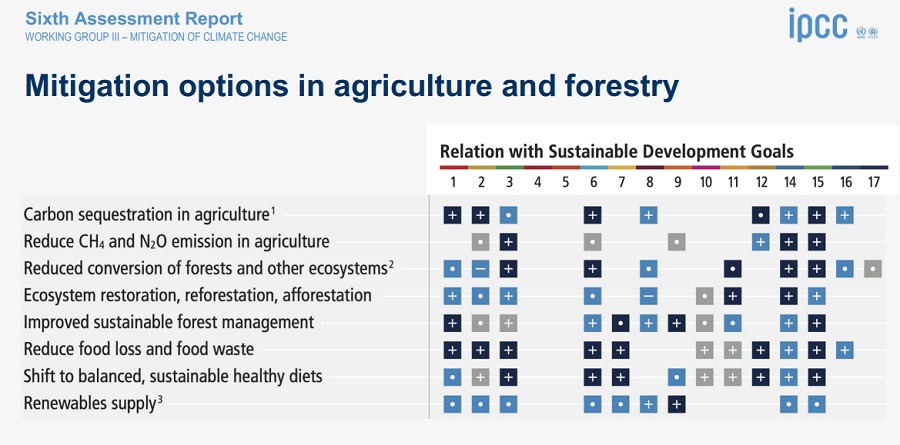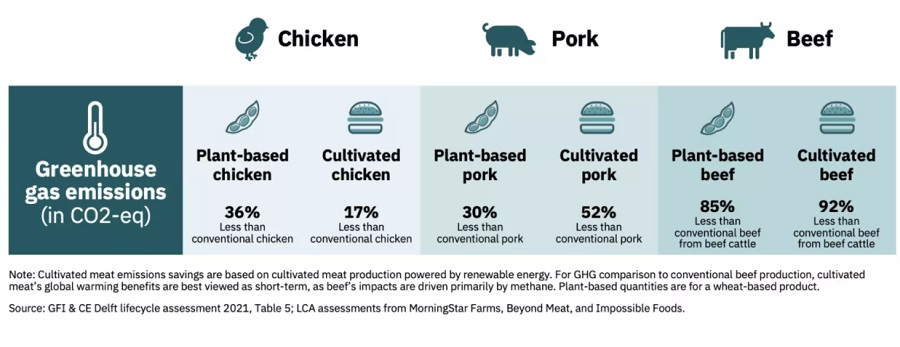NEW IPCC REPORT INTO CLIMATE CHANGE PUTS FOOD SECTOR AT FOREFRONT OF POSITIVE CHANGE
A new report from the IPCC, (Intergovernmental Panel on Climate Change) has found that changing food practices on a global scale could be one of the most significant and most efficient factors in mitigating the effects of climate change, if more action is taken now.
According to the report’s authors, even if fossil fuel emissions were eliminated overnight, the emissions from food production alone would likely make it impossible to stay within the Paris agreement target of 1.5°C of warming.
Instead, they suggested that one of the most effective ways to reduce emissions would be the widespread adoption of plant-based diets, with meat alternatives having the potential to halve greenhouse gases by 2030.
The Sixth Assessment Report by the IPCC takes the closest look yet at how making meat from plants and cultivating it from cells – alongside transitions in the energy and transport sectors – can significantly reduce emissions.
It found that emerging food technologies such as precision fermentation, cultivated meat, and plant-based foods can “promise substantial reductions in direct greenhouse gas emissions from food production” (TS. 5.6.2).
It also found that, as well as reducing emissions, sustainable proteins “lower land, water, and nutrient footprints, and address concerns over animal welfare” (TS. 5.6.2).
Many other benefits associated with a transition to plant-based and cultivated meat are identified, ranging from decreased risk of zoonotic disease, decreased pesticide and antibiotic use, and decreases in pollutants affecting soil health and air and water quality (TS-91).

Currently, 77% of our agricultural land is used for animal agriculture, which supplies only 18% of the world’s calories. Commenting on the report, the Good Food Institute (GFI) said in a statement: “In the face of water scarcity and deforestation, alternatives to animal agriculture can help feed more people while relying on far less land and water.”
Hoesung Lee, IPCC chair, commented: “We are at a crossroads. The decisions we make now can secure a liveable future. We have the tools and know-how required to limit warming.
“I am encouraged by climate action being taken in many countries. There are policies, regulations and market instruments that are proving effective. If these are scaled up and applied more widely and equitably, they can support deep emissions reductions and stimulate innovation,” he said.
Currently, however, meat consumption remains “unsustainably high” according to the Good Food Institute, particularly in Europe and the global north. A 14% rise in global meat production is also expected by 2029.
The GFI Europe is now calling on governments to invest in research that makes plant-based and cultivated meat as delicious and affordable as their conventionally produced counterparts, making it easier for consumers to switch to these foods and enabling sustainable proteins to deliver on their climate mitigation potential.

Seren Kell, science and technology manager at the GFI Europe, said: “The latest IPCC report has made clear that nothing short of a rapid transformation of the food system is essential if the world is to avoid catastrophic climate change.
“As global demand for meat continues to grow, the world’s top scientists have recognised plant-based and cultivated meat as part of the solution.
“Public funding for open-access research is crucial to enable plant-based and cultivated meat to compete with conventional animal products on taste and price, making sustainable choices easy for consumers.
“Time is short to prevent irreversible climate breakdown and species extinction. Changing meat production is a necessary solution that works with existing consumer behaviours, while freeing up land for nature restoration and more sustainable farming practices.”
Moving towards plant-based meat would reduce emissions by 30 to 90%, while cultivating meat could cut the climate impact of meat by up to 92%, slashing land use requirements by up to 95% (see chart below).
For more news on climate change and sustainability, click here
Join us at SIAL Paris as exhibitor Join us at SIAL Paris as visitor
